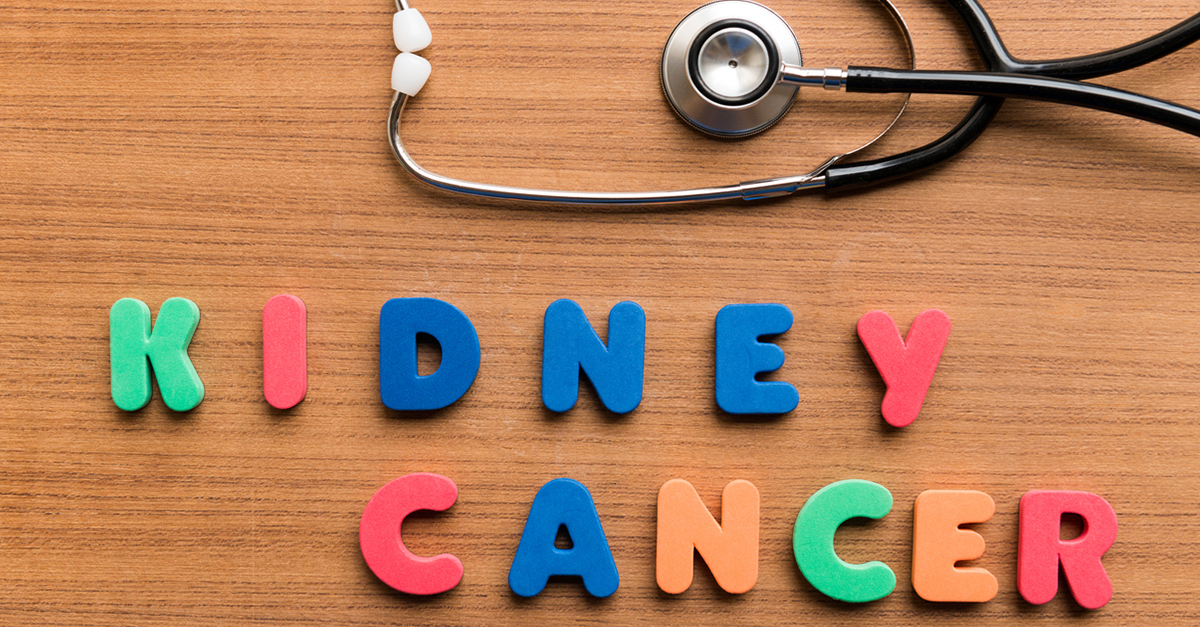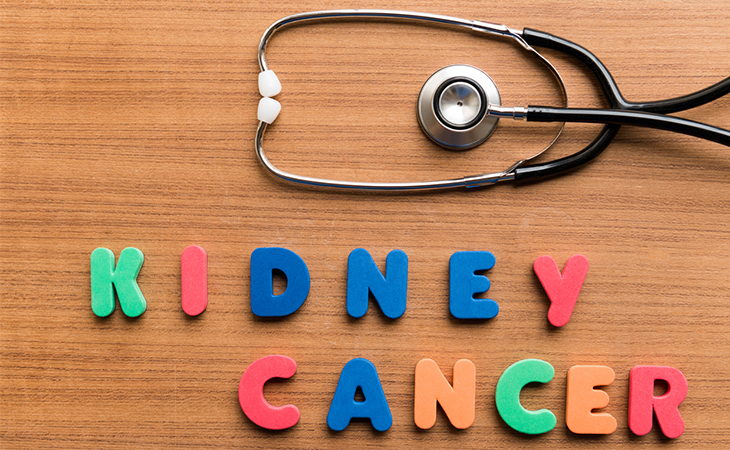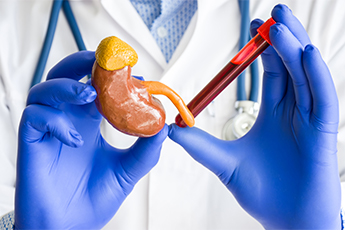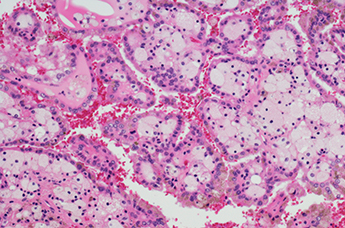What is kidney cancer and what are the risk factors?

The kidneys are two bean-shaped organs responsible for filtering blood and creating urine to rid the body of waste. Kidney cancer occurs when abnormal cells in one or both kidneys begin to grow out of control. About 74,000 people will be diagnosed with kidney cancer in the United States in 2020, making it one of the 10 most common cancers.

What causes kidney cancer?
Scientists are not aware of any one thing that causes kidney cancer. But several risk factors can increase your chance of developing it. Some risk factors (like smoking) can be changed. Others (like age or gender) can’t.
The more risk factors you have, the greater your chance of developing kidney cancer. But having many risk factors does not guarantee you will be diagnosed with the disease.
Risk factors for kidney cancer include:
Chronic kidney disease and long-term dialysis: People who already have advanced kidney disease are at a higher risk for developing kidney cancer. This risk is greater if you are on long-term dialysis (a treatment that filters the blood to remove toxins when the kidneys are too damaged to work properly).
Family history of kidney cancer: Having a parent, sibling, or child with kidney cancer increases your risk. Your risk also rises if extended family members have had kidney cancer before age 50 or have had kidney cancer with multiple tumors.
Smoking: People who smoke have an increased risk of developing renal cell carcinoma, the most common form of kidney cancer.
Gender and age: Men are twice as likely to develop kidney cancer as women. The disease is more common in people between 50 and 70.
Race: African Americans have a slightly increased risk of a kidney cancer diagnosis.
Obesity: Being very overweight or obese leads to hormonal changes that are believed to encourage growth of kidney cancer.
High blood pressure (hypertension): High blood pressure raises your risk of kidney cancer, even if your blood pressure is well controlled with medication.
Overuse of certain medications: These include pain medications like phenacetin, aspirin, acetaminophen, and ibuprofen, as well as diuretics.
Exposure to cadmium: This metallic element is present in some paints, batteries, and welding material.
Genetic conditions that lead to kidney cancer
Sometimes kidney cancer may be caused by genetic mutations (changes). A small percentage of these changes — about 5% — run in families. The known genetic conditions that increase risk of kidney cancer are:
Von Hippel-Lindau syndrome
Hereditary papillary renal cell carcinoma
Birt-Hogg-Dubé syndrome
Familial renal cancer
Cowden syndrome
Hereditary leiomyomatosis and renal cell carcinoma
Tuberous sclerosis complex syndrome
If you know that one of these conditions runs in your family, a genetic counselor can help guide you to the right next steps for managing your kidney cancer risk.
What are the types of kidney cancer?
The most common type of kidney cancer is renal cell carcinoma (RCC), which develops in the kidneys’ small tubes. RCC accounts for about 90% of all kidney cancers.
RCC is further separated into subtypes based on how the cancer cells look under a microscope. Knowing the subtype you have helps your doctor plan the right treatment. It may also help determine whether the cancer was caused by an inherited syndrome. The most common RCC subtypes are:
Clear cell RCC: The cells appear to be clear or very pale. This is the most common type of RCC, accounting for about 70% of cases.
Non-clear cell RCC:
Papillary RCC is made up of cells with small finger-like projections (papillae). This subtype is also called chromophilic RCC because the cells are easily stained in the lab.
Chromophobe RCC cells are also pale but are much larger and have thicker borders.
The other subtypes of RCC are very rare. Together they account for only about 1% of all renal cell carcinomas:
collecting duct RCC
multilocular cystic RCC
medullary carcinoma
mucinous tubular and spindle cell carcinoma
neuroblastoma-associated RCC
unclassified renal cell carcinoma
Other types of kidney cancer
About 10% of kidney cancers are not renal cell carcinomas. There are three types of non-RCC kidney cancer:
Transitional cell carcinoma: Also known as urothelial carcinoma, this type of cancer starts in the lining of the renal pelvis, not in the kidney. The renal pelvis is a funnel-like structure where the kidney meets the ureter. The ureter is a tube that carries urine from the kidney to the bladder.
Wilms tumor: Wilms tumor, or nephroblastoma, occurs almost only in children. Almost all kidney tumors in children are Wilms tumor. This cancer has a high cure rate.
Renal sarcoma: This kidney cancer begins in the blood vessels or connective tissue of the kidney. Only about 1% of all kidney cancers are renal sarcomas.
From the community: “3 days and counting before the surgery to remove my right kidney. There is a 5.6 cm mass on top of the kidney and to the best of our knowledge, the cancer has not spread to any other organs or into the lymph nodes. I am grateful for that and I know there are others who are going through a lots worse situation than mine, but this is me and it is not easy to let go of the anxiety I feel. I pray. I meditate, I talk with others, I sit in silence, and most of all I pay attention to every little detail of how I can prepare for the surgery, making lists, buying the right pillow to sleep with, the RIGHT foods for the clear liquid diet, a gown that opens in the front, a list of what to take to the hospital, treats for the hospital staff to have at my bedside, hugs and kisses chocolates for my grandkids to hold them over until I can be there to give real live ones.” - Inspire member
Sources
About Kidney Cancer. American Cancer Society. February 2020.
Survival Rates for Kidney Cancer. American Cancer Society. February 2020.
What’s New in Kidney Cancer Research? American Cancer Society. February 2020.
Kidney Cancer: Types of Treatment. American Society of Clinical Oncology. August 2019.
Gale Harding G, et al. Symptom burden among patients with renal cell carcinoma (RCC): content for a symptom index. Health and Quality of Life Outcomes. June 2007.
Cancer Stat Facts: Kidney and Renal Pelvis Cancer. National Cancer Institute.
Clear Cell Renal Cell Carcinoma. National Cancer Institute. March 2020.
Genetics of Kidney Cancer (Renal Cell Cancer) (PDQ®) – Health Professional Version. National Cancer Institute. May 2020.
Renal Cell Cancer Treatment (PDQ®) – Patient Version. National Cancer Institute. July 2020.
What Is Kidney Cancer? Urology Care Foundation.
Disclaimer
Member comments are lightly edited for length and to remove identifying information but are otherwise reproduced as they appear in the community as part of public posts.
This content is for general informational purposes only and does not necessarily reflect the views and opinions of any organization or individual. The content should not be used as a substitute for professional medical advice, diagnosis, or treatment. Please consult your healthcare provider about any questions you may have regarding a medical condition.




